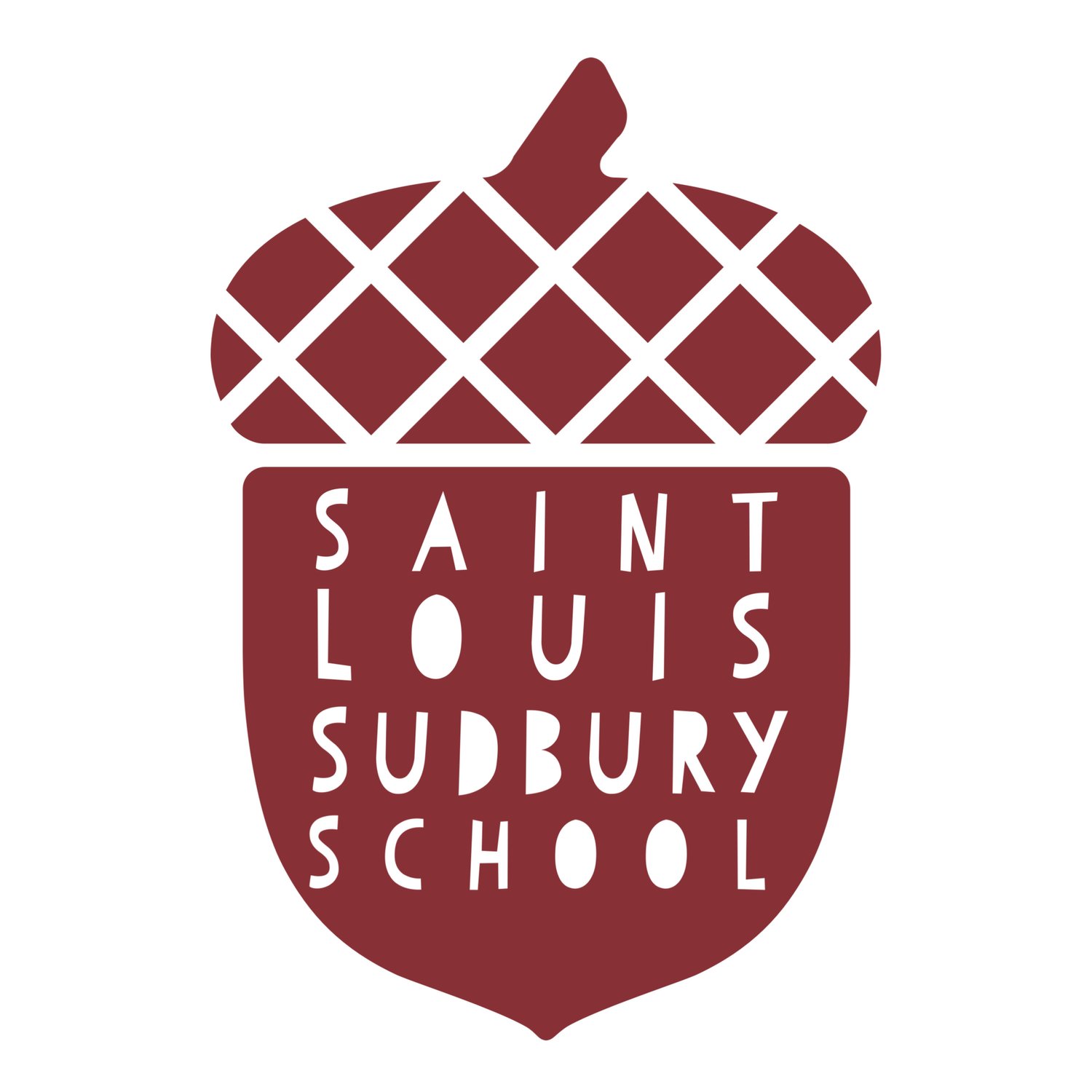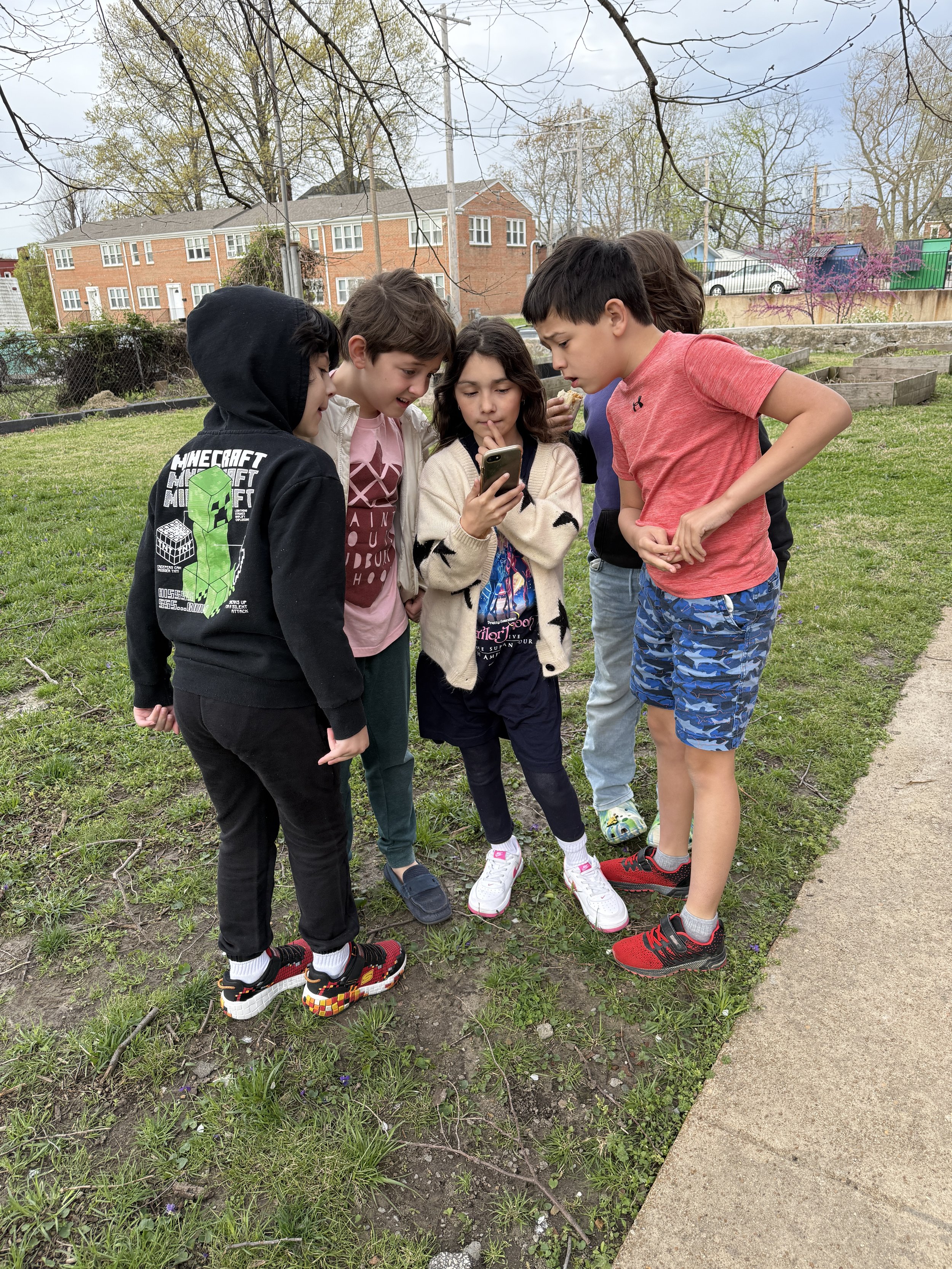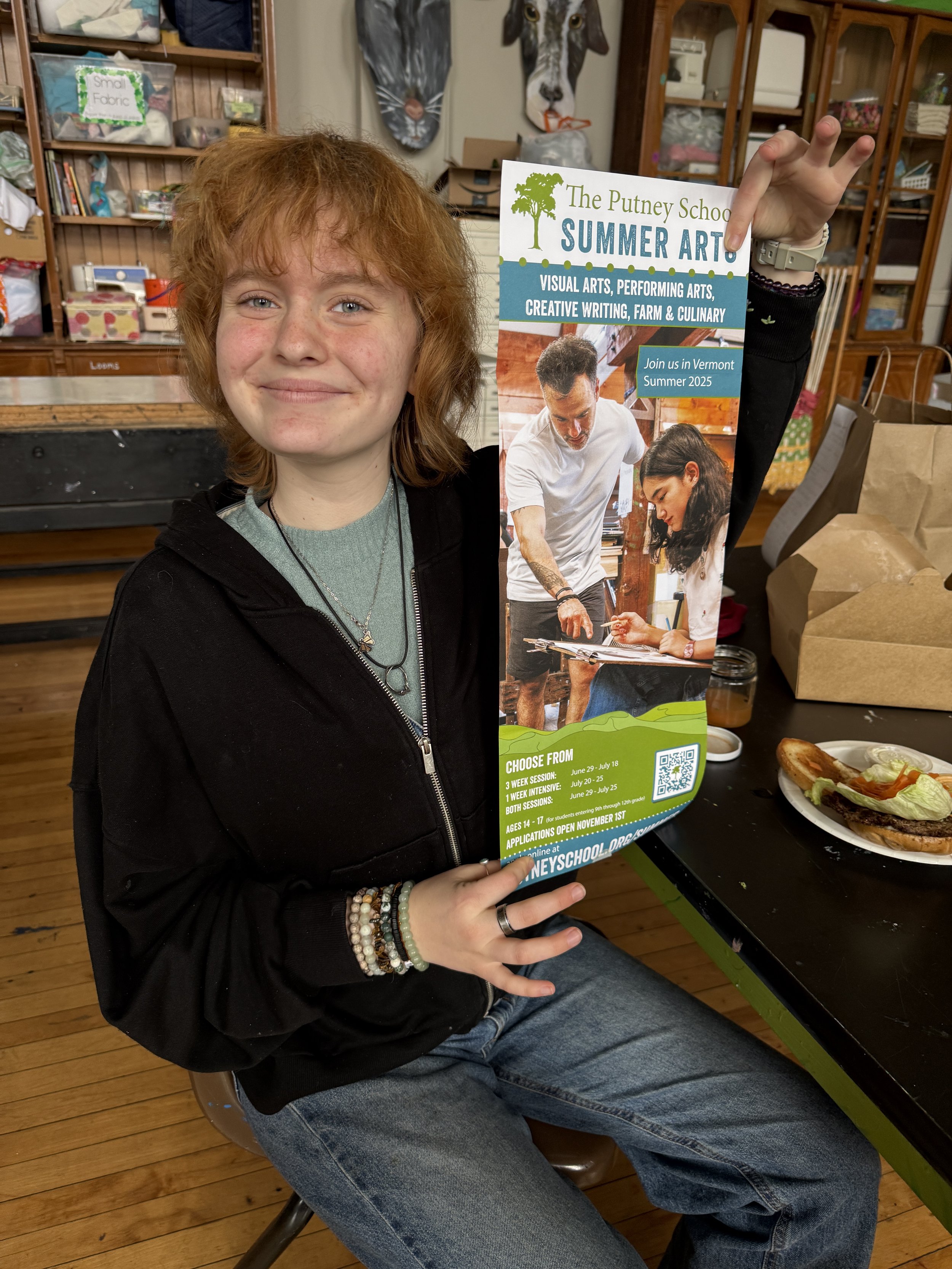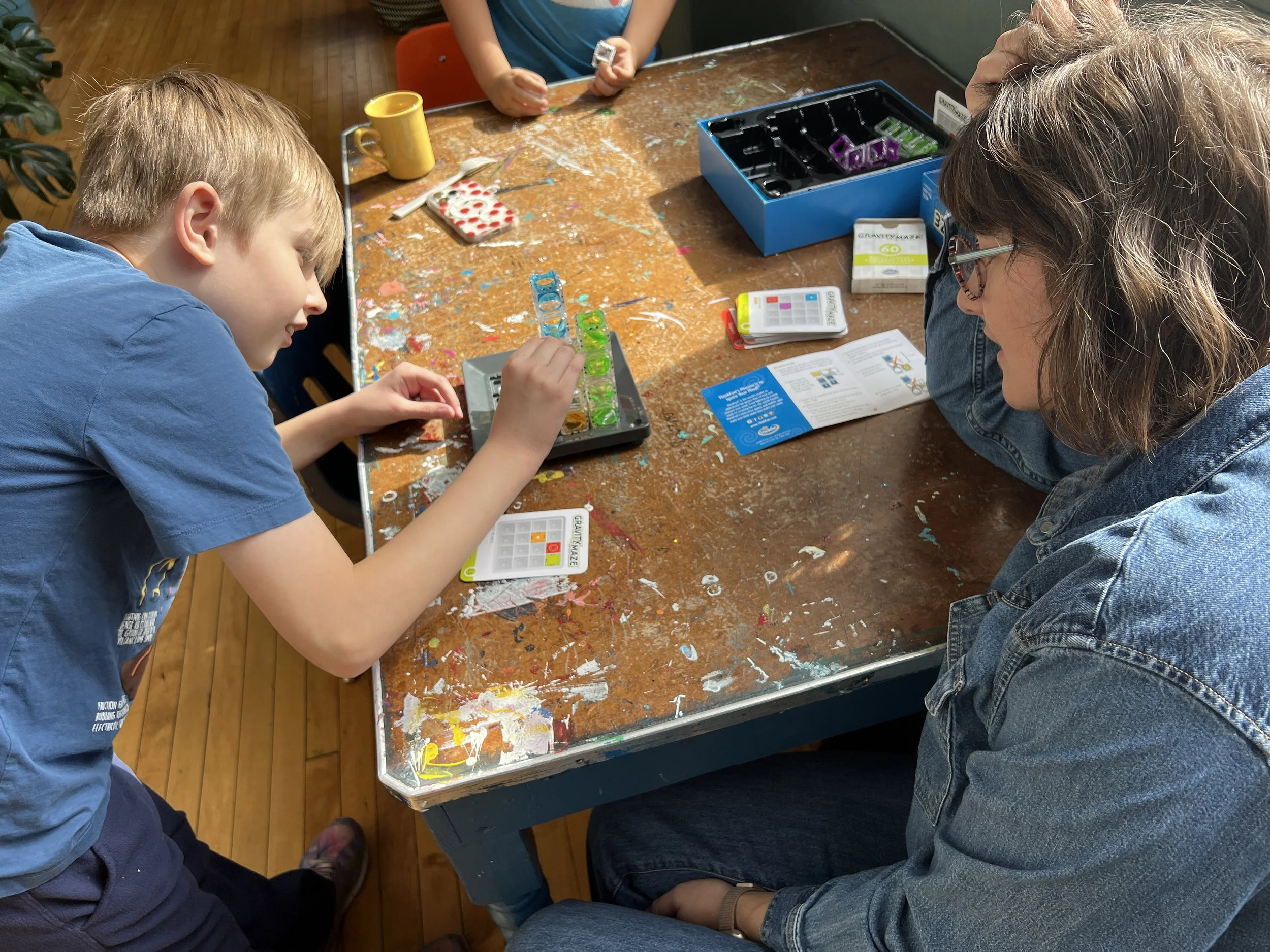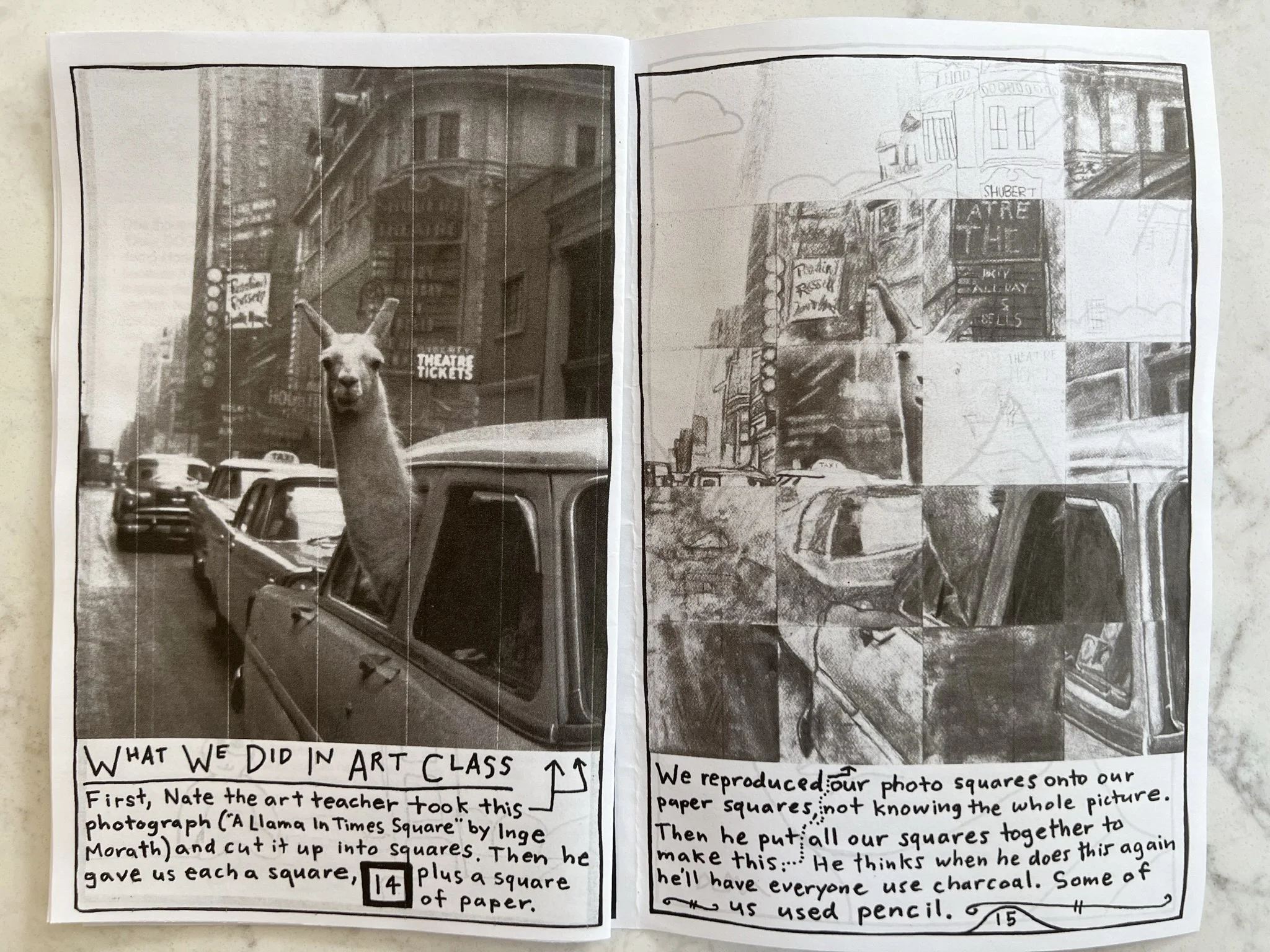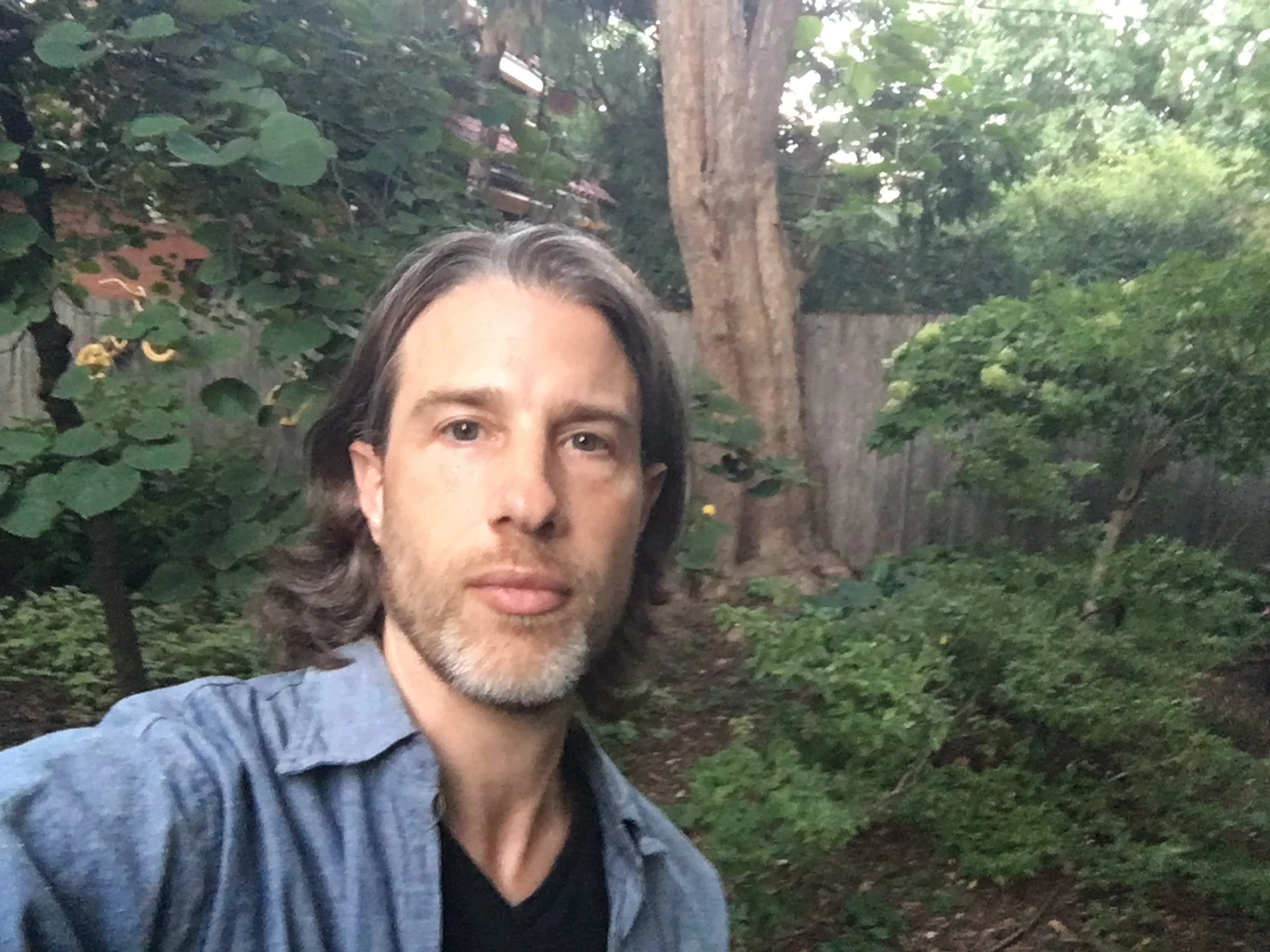One of our students has begun teaching a class about marine biology! After the class, students shared, "It's pretty great! She's a really smart kid..." and "It was good! I learned the scientific names for a lot of animals."
Saint Louis Sudbury School community members can offer to teach a class and students can sign up to be a part of the experience. We love this sharing of knowledge and ideas!
Volunteer & Artist: Nate
Meet Saint Louis Sudbury School volunteer Nate Grundmann! We asked him a few questions recently about his work with the school, what he thinks about the Sudbury model, and more.
How did you get involved as a volunteer with Saint Louis Sudbury School?
I have some friends whose children attend. When I learned the school was looking for volunteers and substitute teachers I decided to apply because I have always enjoyed teaching, and I was curious about the Sudbury model.
What do you enjoy about volunteering at Sudbury?
I enjoy being in an environment where everyone is treated with dignity. No matter the age or role of the person, when you’re in the school there’s no hierarchy and no subordination. Everyone is equal. It’s a really good feeling.
Could you describe some of your favorite experiences at Sudbury?
I teach drawing at the school every Wednesday. Some students are mostly interested in drawing for fun without any specific learning goal, and I enjoy seeing their work and talking about it with them. Others have some specific goals, and it's been fun to see their progress.
I also enjoy seeing the School Meetings because the students get to vote on the decisions that directly affect the experience they will have at the school. It’s cool to see them being empowered like that. Their experience of the world matters as much as anyone else’s, and what better way to show that than to give them that influence?
What do you think of the Sudbury model?
I think the Sudbury model fills a really important niche in the educational system. The curriculum (or lack thereof) offers a great opportunity for students to individualize their education. I also really appreciate the democratic decision making, the lack of grading, and the rule creation/enforcement.
Curriculum
From the perspective of curriculum, I think the Sudbury model is a double-edged sword. On the one hand, while conventional models use a one-size-fits-all approach, at Sudbury the students are free to tailor their education to their needs and interests. I believe that students are more likely to enjoy their lives, be more engaged, and learn more, when they get to choose what they learn, how they learn it, and when.
On the other hand, the freedom at Sudbury makes it easier for students to disengage, to avoid exploration and challenging themselves. This can happen for many reasons: sometimes students may not see the value of learning something, or they may be intimidated by a subject, or they may think it will be boring (as a student I avoided subjects I thought I wouldn’t like, only to learn later that I enjoyed them and had missed an opportunity). So that is a real risk that should not be ignored.
You can take this last point as justification for an educational system that force-feeds students information. But it can also be seen as an invitation to help students overcome their tendencies to avoid being proactive and engaged. It’s important to note, though, that this help is not an inherent part of the Sudbury model, so this help may have to come from outside the school.
Grading
At Sudbury, students’ performance is not graded. While some students may thrive in a model that grades their performance, for others grades can have a damaging effect. For many students, grades are experienced as a source of approval and disapproval (which are internalized as pride and shame) to coerce them into learning subjects they aren’t motivated to learn. This approval/disapproval dynamic can reinforce the idea that one’s self-worth comes from outside of themselves (other’s opinions, accomplishments, etc.). The belief that self-worth is extrinsic has damaging emotional and psychological consequences.
Consider the person that believes their self-worth is extrinsic. When they risk failure or rejection it feels like they are risking their self-worth, and when they make a mistake (a necessary part of learning) it feels like their worth is diminished. This makes risking failure and rejection an anxiety-inducing experience. That’s a real problem, because people avoid things that cause anxiety and pain, so this person is more likely to avoid taking the risks they will need to take in order to learn and to create the lives they want. What’s more, when they do take these risks they are likely to perform more poorly because anxiety erodes performance (as many students experience when taking tests).
Alternatively, consider the person that believes their self-worth is intrinsic. Their self-worth is not at all in jeopardy when they risk failure and rejection. To them, their mistakes are simply opportunities for growth, and rejections are just speed bumps along the way. These students have greater levels of confidence and emotional resilience, and in general they perform better and are more satisfied in life.
Ironically, much of this satisfaction is rooted not in their improved performance, but rather in healthy core beliefs, such as the belief that they deserve to feel good no matter what they accomplish or who approves of them. Any external accomplishments or approval are just icing on the cake. But for the person who sees their self-worth as extrinsic, they will always be in pursuit of a deeper sense of satisfaction that can never be accessed via accomplishments and the approval of others.
It’s also important to note that students don’t need grades to evaluate their performance. They do that naturally when they care about their work. The more they care, the more they will strive for excellence. If excellence is important (and I’m not saying it is or isn’t), there are other ways to encourage it that don’t risk a distorted appraisal of self-worth.
Given that students don’t need grades to evaluate their performance, and considering the psychological and emotional risks that come with grading, I appreciate that grading isn’t a part of the Sudbury model.
Democratic Decision Making
At Sudbury, everyone in the community makes decisions together, democratically, no matter their age or role at the school. This reinforces the idea that everyone deserves to be heard and responded to, simply by virtue of being present. In this way, at Sudbury, intrinsic self-worth is not just an idea, it’s a practice.
Rule Creation and Enforcement
I also really appreciate the way the Sudbury model handles rule creation and enforcement. I won’t go into much detail about the mechanics because it would be too much to describe here, but I will say that the rules are created by a democratic process that includes the students, and I think the whole process treats the students with more dignity than in the other models I’ve seen. I have been a substitute in public schools as well as at Sudbury St. Louis, and from the perspective of a substitute, there is really no comparison. As a sub in public schools, you are expected to monitor the students for misbehavior, and this creates an adversarial dynamic between the students and substitutes. As a substitute at Sudbury, however, rather than being expected to police, I am expected to treat them with the same dignity and respect with which I would like to be treated, all according to the rules that they were an equal part of creating. In this way the Sudbury model practices the philosophy that everyone matters exactly as much as everyone else, and thus everyone has intrinsic worth.
Final Thoughts
Ultimately it’s important to acknowledge that there is no single model that is perfect for everyone. Depending on a student’s temperament and educational goals, Sudbury may or may not be the right option. It’s also vital to acknowledge that nobody’s educational journey is perfect. Though it’s important for a student to try to learn the most important subjects that will prepare them for whatever stage of life is next, it is also very important (perhaps more important than any specific subject) that a person develop the core psychological and emotional traits (intrinsic self-worth, emotional resilience, confidence, etc.) that will empower them to plot their course in life, care for themselves, handle life’s setbacks, and persevere to accomplish their chosen goals and create the life they want.
What has surprised you during your time at Sudbury?
The students are much more kind to one another than I remember students being when I was in school. It’s really refreshing.
What are you listening to, watching, or reading lately? And... what is your favorite food (if you have one)?
I recently rewatched Annihilation, a surreal Sci-Fi thriller written and directed by Alex Garland. It's such a good movie if you like stuff that is kinda existential, mind-bending, and very visually compelling. I also recommend a couple of Garland's other works, Devs and Ex Machina, for the same reasons. Besides that I am watching The Sandman, The Resort, and Reservation Dogs.
Lately some songs in my rotation are:
I'm a Kid by Jadu Heart,
Midnight Sun by Nilüfer Yanya,
Lipstick on the Glass by Wolf Alice,
Fantasmas by Ambar Lucid,
Hit Me Where it Hurts by Caroline Polachek
Food:
Can’t pick a favorite, but I’m pretty much always in the mood for Thai.
Meet William
We recently chatted with William, a wonderful volunteer at Saint Louis Sudbury School.
About William
My full name is Guilherme Frederico Lima de Carvalho e Silva, but now I go by the much easier 'William.’ I'm originally from Rio de Janeiro, Brazil, but I lived for over a decade in the UK, and in Alaska for five years before moving to St Louis. I have a Ph.D degree in Pure Mathematics from Cambridge, I'm currently involved in a few Data Science projects and searching for a job where I can mix that and my other great passion: board games!
How did you get involved as a volunteer with Saint Louis Sudbury School?
My two step kids were enrolled in Sudbury, and both my wife, Brooke, and our excellent friend Phoebe were volunteers. They suggested it to me since I had already volunteered with the chess club at their previous school and really liked it.
What do you enjoy about volunteering at Sudbury?
Just seeing what the students spontaneously create and invent is fascinating. I also really enjoy having conversations with the older students, and trying to see the world through their perspective. And sometimes I get to play board games...! I'm also constantly learning from how the staff handles everything and constantly impressed by their communication skills -- administrating such an unorthodox institution is non-trivial, so props to Mae, Alayna, and everyone else involved!
What do you think of the Sudbury model?
I think it's a good model, mostly because of its support for self-directed learning. With over 20 years of experience in teaching, I strongly believe that self-direction is incredibly important, if not essential to the learning process. I also feel that democratic schools are great in building a sense of personal agency and participation in a community, and this is of uttermost importance in a healthy democratic society. My main qualm with the Sudbury model lies in the fact that it has a fairly strong libertarian inclination in its foundational values, which clashes with my own socialist views. Daniel Greenberg was the founder of the original Sudbury Valley School in Massachusetts and its "main philosopher," according to Peter Gray. Even though he had incredibly valuable insights regarding schooling, education, and individuality, unfortunately there is a fair amount of American exceptionalism in his writings on this topic. Having come from a country which suffered a great deal in the hands of US foreign policy, this is something to which I have very strong antagonistic ideas and feelings, yet I feel that the main aspects of the model transcend these ideological boundaries. I think I'd have loved Sudbury if I had been a student there.
What has surprised you during your time at Sudbury?
I was really impressed with how well the students handle the Judicial Committee. Most adults would presume they'd lack maturity for such things, but it really isn't the case.
Has volunteering at Sudbury changed you in some way?
Since joining the Sudbury community I've become increasingly interested in self-directed learning and its different implementations, and different education systems in general.
What are you listening to, watching, or reading lately? And... what is your favorite food (if you have one)?
Apart from technical books on mathematics, statistics and programming, I'm currently reading Peter Gray's Free to Learn, and I just finished Daniel Greenberg's Free at Last: The Sudbury Valley School. I have Better Off, written by Sudbury volunteer Eric Brende, and it's currently just waiting in line. My favourite television show is the German Netflix production Dark. I'm currently rewatching Game of Thrones and eagerly awaiting the release of Dune: Part Two in the cinemas. And I gotta say, I'm a huge fan of St. Louis-style barbecue.
Volunteer View
Volunteer View
by Phoebe Love
What a volunteer does at Sudbury depends mostly on the volunteer. In my case a lot of it has been playing and inventing/revising games (board or card). Maybe it’s a phase, I don’t know. At the moment, I’m helping Johl invent a game he calls “Naval Warfare, WWI Edition.”
What is it like day to day? As you might know, apart from scheduled meetings, there is no schedule of the sort that mandates people be doing certain things at certain times, except cleaning up at the end of the day. This made me mildly nervous at first. What am I doing? Why am I here? I had read about the Sudbury model in the book “Free to Learn” by Peter Gray, but I knew that I would never really know what it was like unless I was there, and I was right. I’m not the sort of person whose infectious enthusiasm and charisma light up a room, followed by spontaneous conga-line formation, etc., and I sat there feeling useless and doing nothing for a bit. This is why I generally hate parties, unless there’s dancing. But “What am I doing and why am I here?” are questions everyone has to answer, unless they are asleep or doing something they have no choice over. These can be very uncomfortable questions, which is why the greeting, “Staying busy?” is seen as perfectly normal, and why lots of people, especially (and traditionally) men, find retirement depressing. People like to feel useful, myself among them, and also like to feel connected to other people, which has grown harder in our world over the years (See the book: “Lost Connections” by Johann Hari). Because of this, some people (ahem, I) feel quickly unmoored when we have nothing to do, nothing that is specifically expected of us in a given moment. Suddenly we’re the astronaut in the song, whose tether to his ship (and planet and species) has been cut, because the tether is that thin. I even hate vacations sometimes. Point being, this experience has been challenging in a good way, and it very often feels like we’re all in a giant experiment to change our culture, constantly observing, hypothesizing, trying, learning, adjusting, changing, re-observing, comparing notes, again and again. Funtimes!
OK back to Naval Warfare, WWI Edition: One day I was making tiny flags out of toothpicks, for a game involving a spinning cardboard pie dish cover, while playing Code Names Jr. with (among others) Johl. He asked for one of the toothpicks, and later that day he showed me a flag he’d made with said toothpick. I recognized, in the center, the double-headed eagle that I remembered from a brief visit to Vienna (it’s everywhere), even though it was the size of a small pea, and he told me it was the German naval battle flag from WWI. I immediately and predictably chirped, “Let’s make a game!” That was a few days ago, and I’ve learned a lot about U Boats and depth charges since then, as has Johl, although he knew much more about them than I did from the start. What I do in this collaboration is basically ask questions like, “Do boats get to dock at ports of other countries?” and he figures it out.
As I’m writing this, we’re all at Tower Grove Park for a “park day,” which is when we spend the whole day at a park. In front of me a 7 year old is taking apart a large tree branch that probably fell from a recent storm, and behind me people are kicking balls around, reading, or watching the scooter dudes (members of the public, not students) zoom around the empty fountain basin. Last park day, another volunteer brought Four Player Chess, a zany variation which attracted a few rubbernecking passersby, slack-jawed at the slight of black, white, blue, and orange pieces all on an extended board. One of them declared, “I learn something new every day!” Yes yes! Very much our view on education via exposure and doing. Park days happen when someone, usually a student, notices a day of nice weather coming up, and makes a motion at school meeting for that upcoming day to be a park day. I’ve never seen one of these motions fail to carry, although we did cancel one once when the forecast changed. School meeting and the democratic process are the lynchpin of this whole thing. More on that some other time, because that really could be a whole book.
Student Spotlight: Johl
Johl: A Gentleman and a Scholar
By Mae
“Wartime.”
When asked what sort of history interests him the most, Johl responds, “Wartime.”
Today I’m interrupting Johl in the middle of his Napoleonic video game on Roblox. (On the record, he is disappointed at how “underrated” Roblox is among his preteen peers, since it has so much to offer and is such a fun platform). He is gracious and doesn’t hesitate to meet me in the hall to converse.
Asking Johl if he wants to discuss history (particularly historical wars) is like asking a musician about their instrument of expertise. Johl doesn’t waste time in giving me an earful on the era he’s most interested in - late 18th century to the early 20th century. World War I is his favorite. He points out to me that “it was at this point that line warfare was just completely obsolete.” I try to keep up, but mostly I just appreciate his slow, methodic cadence as he describes the ills of war to me. He paces around as we converse. His posture and stride are consistent, somewhat soldierly.
Johl regularly wears historical military uniforms to school. Most days he’s in full fatigues complete with boots and hat. On occasion he accessorizes with a giant flagstaff flying a French flag. He mentions that he has about 5 different uniform coats and pants to choose from on any given day. His favorite at the moment is an Uhlan uninform - which is a WWI Germany cavalry uniform. An Uhlan is a type of Polish soldier, one that wears an impressive cap/helmet. I once observed Johl spend hours trying to construct an accurate design for a uniform cap, so I know he’s meticulous when it comes to the design in a helmet.
Johl takes a seat next to me before telling me that he’s currently creating a game around his interest in wartime history. The name of the game is Naval Warfare: WWI edition. I’m told it’s in the very early stages of development. I admit that I’m not at all a history buff or a wartime researcher, but I can’t wait to test Johl’s game with him. His passion for his project is contagious.
Johl’s been a student at Sudbury for over a year and a half. Before enrolling at Sudbury, he was at a public school. “It was a completely different experience,” he says. “I remember mostly that I didn’t feel that free… and I felt bored all the time. I memorized a lot of things, but once I completed things it was just kind of all gone. And I couldn’t remember anything that I spent a bunch of time on in school.”
At Sudbury Johl feels more free, in part because he gets to spend his time however he wants. He doesn’t work on things he doesn’t care about (only to forget the information immediately), but spends hours looking up historical information that’s of interest to him, playing video games, and talking to his friends.
He mentions that he has advice for new students coming into Sudbury, which is simple: Hang out. “Hang out with staff. Hang out with students. Hang out with volunteers.” Start where you feel safe until you “drift off” to other things and people, he says. At Sudbury, Johl is recognized by everyone and is comfortable moving about the space freely. Sudbury is his stomping grounds; when asked how he views Sudbury, his response is, “This is my territory.”
